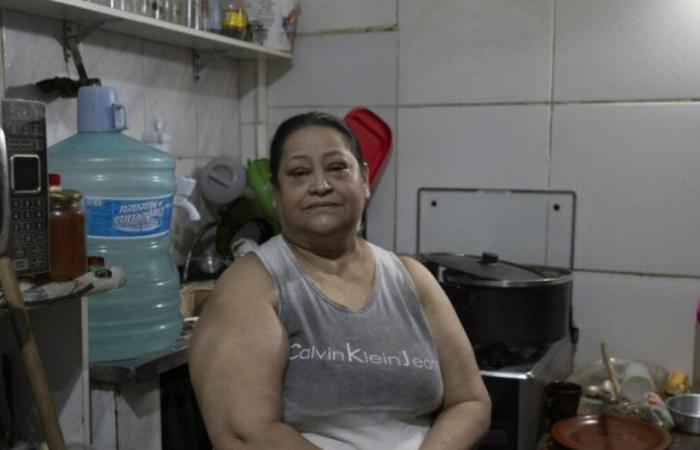In Neide Fernandes’ refrigerator, no meat or vegetables but around twenty eggs, “the cheapest” of animal proteins. This 60-year-old former cashier lives with her husband and two teenage grandchildren in a tiny two-room apartment in a room in an abandoned hotel in the center of Rio de Janeiro. Electrical wires run along the squat’s narrow, dark corridors.
“We don’t have the means to eat three real meals a day,” she confides. His family is among the estimated 40 million Brazilians suffering from “food insecurity,” according to the UN.
Family Bag. Hunger still rages in Latin America’s largest economy with 212 million inhabitants, even if the fight against this scourge is progressing. It is also on the strength of the successes recorded at home that left-wing President Luiz Inacio Lula da Silva will launch on Monday, at the opening of the G20 summit in Rio, a “Global Alliance against hunger and poverty”.
Since her husband found himself unemployed eight years ago, Neide Fernandes has received the Bolsa Familia (Family Grant), a flagship social program of Lula, which provides an allowance paid to families on the condition that their children are in school. “But with 600 reais (around 100 euros) per month, we bring back almost nothing from the supermarket,” she emphasizes.
Packed lunch. In the last presidential election, Ms. Fernandes voted without hesitation for Lula, whose ambitious social programs lifted millions of Brazilians out of poverty during his first two terms (2003-2010). Among them, Bolsa Familia, which Lula reestablished after returning to power in January 2023. “I thought he was going to do more, but in the end, I didn’t really feel any improvement” since his return, she regrets.
But the former metalworker born into poverty is still popular with Aila Martins, 36, also a recipient of the Bolsa Familia. “We know his story, he too experienced hunger, and he really makes a difference,” says this mother of three children, pregnant with her fourth.
However, she is waiting in line to receive a packed lunch at the premises of Açao da Cidadania (Citizenship Action), a leading NGO located in a working-class neighborhood of Rio, at the foot of a favela.
According to the latest report from the United Nations specialized agencies on global food insecurity (SOFI 2024), the number of people with a severe or moderate degree of food insecurity in Brazil fell by 70.3 million over the period 2020-2022 – which includes the Covid-19 pandemic – to 39.7 million over the period 2021-2023, or 18.4% of the population.
“Degrading deprivation”. Lula’s government says it has obtained data from the UN taking into account exclusively the year 2023 and showing an 85% drop in the number of Brazilians in a state of severe food insecurity, from 17.2 million in 2022 (8% of the population) to 2.5 million (1.2%) last year.
“We are observing a marked decline, but that does not mean that the problem of hunger in Brazil is resolved, quite the contrary,” warns Rodrigo Afonso, executive director of Açao da Cidadania.
It was at the headquarters of this NGO, which prepares 1,000 packed lunches per day, that Lula presented his “Global Alliance Against Hunger” in July. With tears in his eyes and sobs in his voice, he urged action against “the most degrading of human deprivations”.
“Budgetary” constraints. This alliance will bring together countries from around the world and international institutions to provide financial resources to fight hunger or replicate initiatives that work locally.
For Marcelo Neri, director of FGV Social, the social studies branch of the prestigious Getulio Vargas Foundation, Bolsa Familia can serve as an example, but also another program allowing Brazilian children in public school to benefit from at least one free meal. The budget for this system was increased by 39% in March 2023, after six years without an increase.
But these programs have a high cost, more difficult to absorb than during the first mandates of Lula, who rode the boom in raw materials. “The challenge for Brazil is not to show results, which have appeared quickly, but to be part of continuity,” warns Mr. Neri, which is “endangered” by the “budgetary” constraints weighing on the government.
Louis ENJOYMENT
© Agence France-Presse






